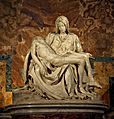Italophilia facts for kids

Italophilia means having a strong admiration or love for Italy. It includes appreciating its culture, society, art, and people. It often involves looking up to Italy's ideas and way of life.
Contents
What is Italophilia?
The word "Italophilia" describes a positive feeling towards Italy. It is used in two main ways: in politics and in culture. People who have these feelings are called "Italophiles."
A strong love for Italy began to grow in Europe during the Italian Renaissance. This was a time of great art, learning, and discovery.
Why People Love Italy
One big reason for Italophilia is that Italy has more World Heritage Sites than any other country. These are places like ancient ruins or famous buildings. UNESCO says these sites are very important for culture. About 60% of the world's famous artworks are found in Italy.
People worldwide also love Italian food and cooking. Italy is famous for its delicious pasta, pizza, and gelato. It is also a major producer of wine. In 2005, Italy made over 5 million tonnes of wine. Many Italian wines, like "Chianti," are well-known around the globe.
Italophilia Around the World
In countries where many Italians moved over the centuries, Italophilia is very common. Countries like Argentina, Brazil, Uruguay, Canada, and the USA have millions of people with Italian family roots. These people often help spread love and appreciation for Italy in their communities.
Giorgio Silvestri, a director from Italy, has estimated that there are about 250 million Italophiles worldwide. This shows how much Italy is admired across the globe.
Related pages
Images for kids
-
Statue of Augustus, the first Roman Emperor. He helped create "Italia" as a unified place.
-
Statue of Dante at the Uffizi Gallery in Florence.
-
Michelangelo's famous sculpture, the Pietà.
-
Galileo Galilei, who is known as the founder of modern science.
-
Guglielmo Marconi, a pioneer in developing wireless telegraphy and long-distance radio.
-
Enrico Fermi, a pioneer in nuclear power.
See also
 In Spanish: Italofilia para niños
In Spanish: Italofilia para niños
 | John T. Biggers |
 | Thomas Blackshear |
 | Mark Bradford |
 | Beverly Buchanan |









